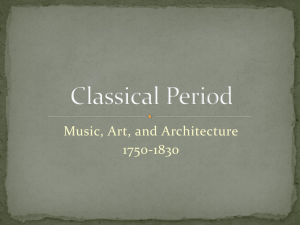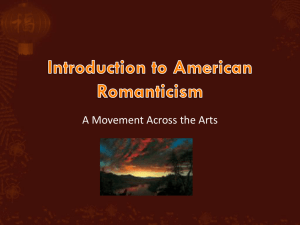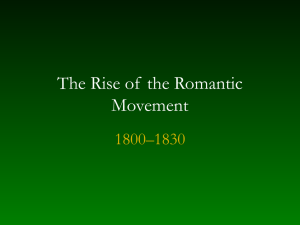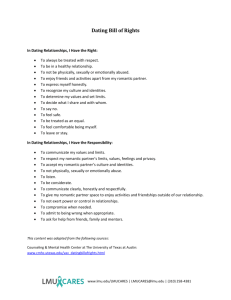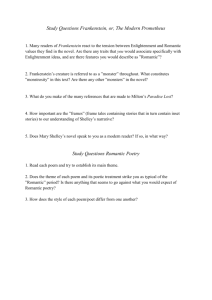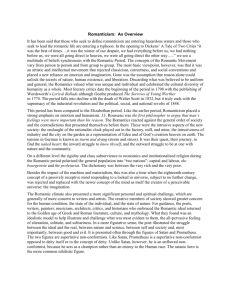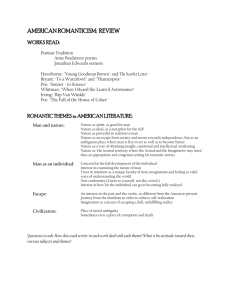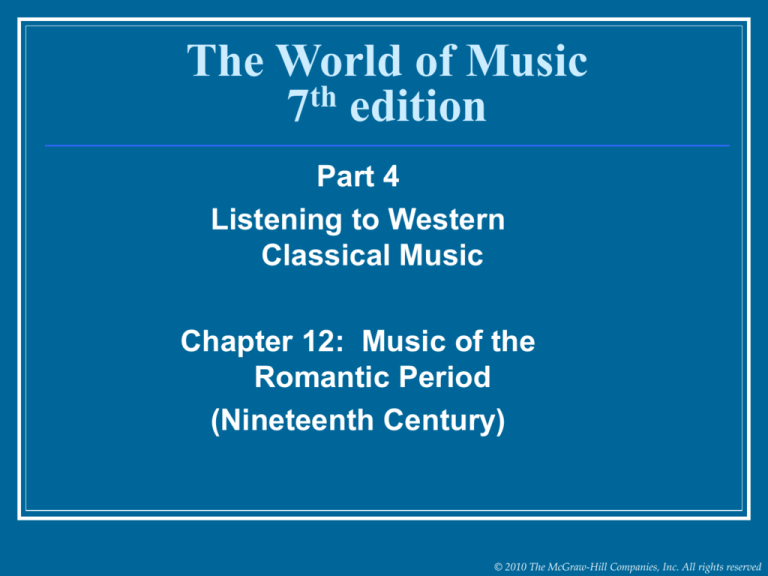
The World of Music
7th edition
Part 4
Listening to Western
Classical Music
Chapter 12: Music of the
Romantic Period
(Nineteenth Century)
© 2010 The McGraw-Hill Companies, Inc. All rights reserved
Attributes of the Romantic Period
Revolution
Capitalism
Emotion
Imagination
A Desire to be
Different
Nationalism
Part IV Listening to Western Classical Music
Chapter 12 Music of the Romantic Period
© 2010 The McGraw-Hill Companies, Inc. All rights reserved
Changes in Musical Life
Patronage System in Decline
Composers must Promote Themselves
Creates need for:
Concert Managers (Impresarios)
Music Publishers
Music Critics
Virtuosi Become Celebrities
Much Music too Difficult for Amateurs
Creates need for Teachers
Part IV Listening to Western Classical Music
Chapter 12 Music of the Romantic Period
© 2010 The McGraw-Hill Companies, Inc. All rights reserved
Absolute and Program Music
Absolute
Classical
Music for its own sake
No intended imagery
Characteristic of:
Sonata
Symphony
Concerto
Program
Depicts:
Moods
Images
Stories
Characters
Reflects interest in
poetry
Part IV Listening to Western Classical Music
Chapter 12 Music of the Romantic Period
© 2010 The McGraw-Hill Companies, Inc. All rights reserved
Characteristics of Romantic Music
Programmatic
Lyrical Melodies
Chromaticism
Dissonance
Emotional
Complex Rhythms
Syncopated
Irregular
Bigger (and more Varied) Orchestras
Part IV Listening to Western Classical Music
Chapter 12 Music of the Romantic Period
© 2010 The McGraw-Hill Companies, Inc. All rights reserved
Forms of the Romantic Period
Sonata Common, but less Strict
Symphonic Poem
Stage Forms
Overture
Prelude
Suite
Incidental Music
Many Different Chamber Groups
Part IV Listening to Western Classical Music
Chapter 12 Music of the Romantic Period
© 2010 The McGraw-Hill Companies, Inc. All rights reserved
Opera in the Romantic Period
Composers
Verdi
Wagner
Rossini
Puccini
Richard Strauss
Great Variety in Size and Subjects
Romantic Operas Still Performed Today
Part IV Listening to Western Classical Music
Chapter 12 Music of the Romantic Period
© 2010 The McGraw-Hill Companies, Inc. All rights reserved
Ballet
Originally Part of
Opera
Features Dancing
Solo
Ensemble
Famous Tchaikovsky
Ballets
Sleeping Beauty
Swan Lake
The Nutcracker
Part IV Listening to Western Classical Music
Chapter 12 Music of the Romantic Period
© 2010 The McGraw-Hill Companies, Inc. All rights reserved
Keyboard Music
New Miniature Forms
Character Pieces
Solo (Voice) Song with
Piano
Expressive
Lyrical and Dramatic
Technically
Demanding
Chopin Miniature
Forms
Impromptu
Nocturne
Mazurka
Polonaise
Prelude
Waltz
Étude
Part IV Listening to Western Classical Music
Chapter 12 Music of the Romantic Period
© 2010 The McGraw-Hill Companies, Inc. All rights reserved
Songs
Solo Voice with Piano
Usually Short
Schubert
Wrote over 600 Songs
Frequently used words of German Poets
Highly Expressive
Often Strophic
Part IV Listening to Western Classical Music
Chapter 12 Music of the Romantic Period
© 2010 The McGraw-Hill Companies, Inc. All rights reserved
Johannes Brahms (1833–1897)
German
Traditionalist
Traits of his Music
Passionate
Introspective
Rich/Dark
Lyrical
Complex Rhythms
Intricate Polyphony
Mostly Absolute
Output
4 Symphonies
1 Violin Concerto
2 Piano Concertos
Much Chamber Music
Sonatas
Piano
Cello
Violin
Clarinet
Part IV Listening to Western Classical Music
Chapter 12 Music of the Romantic Period
© 2010 The McGraw-Hill Companies, Inc. All rights reserved
Frédéric Chopin (1810–1849)
Polish
Pianist
Unique Compositional
Style
Output
Many Miniatures
3 Piano Sonatas
2 Piano Concertos
Elaborate Decorative
Melodies
Colorful, Dissonant
Harmonies
Extreme Rubato
Part IV Listening to Western Classical Music
Chapter 12 Music of the Romantic Period
© 2010 The McGraw-Hill Companies, Inc. All rights reserved
Felix Mendelssohn (1809–1847)
German
Wealthy Family
Widely Traveled
Traditional (Classical)
Style
Well-Known Pieces
“Scotch” Symphony
“Italian” Symphony
Elijah Oratorio
Violin Concerto in E
Minor
Hebrides Overture
Midsummer Night’s
Dream Incidental Music
Part IV Listening to Western Classical Music
Chapter 12 Music of the Romantic Period
© 2010 The McGraw-Hill Companies, Inc. All rights reserved
Franz Schubert (1797–1828)
Prolific Song
Composer
Struggled with poverty
and illness
Style
Great variety
Lyrical melodies
Colorful harmonies
Great sensitivity to
poetic texts
Output
600 + Lieder
2 Song Cycles
9 Symphonies
22 Piano Sonatas
Miniatures
Chamber Pieces
Choral Works
Part IV Listening to Western Classical Music
Chapter 12 Music of the Romantic Period
© 2010 The McGraw-Hill Companies, Inc. All rights reserved
Pyotr I’yich Tchaikovsky (1840–1893)
Russian
Influences
Tuneful
Accessible
Emotional
Output
Russian Folk Songs
Italian Opera
French Ballet
German
Symphonies/Songs
Style
6 Symphonies
Concertos
Violin
Piano
Ballets
Swan Lake
Sleeping Beauty
The Nutcracker
Part IV Listening to Western Classical Music
Chapter 12 Music of the Romantic Period
© 2010 The McGraw-Hill Companies, Inc. All rights reserved
Giuseppe Verdi (1813–1901)
Italian
Known for Opera
Representative Works
Unhappy
Tragic Endings
Invited to open Carnegie
Hall
Style
Opera
Conventional Harmonies
Predictable Rhythms
Superb Melodies
Theatrical
Rigoletto
La Traviata
Il Trovatore
Aida
Choral
Te Deum
Requiem
Part IV Listening to Western Classical Music
Chapter 12 Music of the Romantic Period
© 2010 The McGraw-Hill Companies, Inc. All rights reserved
Richard Wagner (1813–1883)
German
Revolutionary
His Music Drama had
equal portions of:
Music
Drama
Poetry
Stagecraft
Style
Symphonic
Strong Brass
Leitmotiv
Colorful
Wrote own Libretti
Music Dramas
The Ring of the
Nibelung
Tristan and Isolde
Part IV Listening to Western Classical Music
Chapter 12 Music of the Romantic Period
© 2010 The McGraw-Hill Companies, Inc. All rights reserved
Other Romantic Composers
Hector Berlioz
Antonin Dvořák
Edvard Grieg
Franz Liszt
Gustav Mahler
Giacomo Puccini
Sergei Rachmaninoff
Nicolay RimskyKorsakov
Gioachino Rossini
Robert Schumann
Bedřich Smetana
Richard Strauss
Part IV Listening to Western Classical Music
Chapter 12 Music of the Romantic Period
© 2010 The McGraw-Hill Companies, Inc. All rights reserved
Chapter Summary
Why do you think Romantic Period music is so
much more popular than modern classical music?
What can you learn by listening to a piece multiple
times?
Do you think the emotional language of Western
music is universally human or culturally learned?
Would a Brahms symphony communicate the
same emotions to a rural Chinese farmer that it
does to you?
Part IV Listening to Western Classical Music
Chapter 12 Music of the Romantic Period
© 2010 The McGraw-Hill Companies, Inc. All rights reserved
Image Credits
Slide 2
Slide 8
Royalty-Free/CORBIS
© Digital Vision
Part IV Listening to Western Classical Music
Chapter 12 Music of the Romantic Period
© 2010 The McGraw-Hill Companies, Inc. All rights reserved

